Other research and professional projects
Attitudes on Inequality and Injustice in Croatia
About project
Project basics
- Coordinator: Institute for Social Research in Zagreb
- Financed by: Ministry of Science, Education and Youth
- Project duration: 1 February 2022 – continuously
Project description
Inequality is one of the great challenges that 21st century democracies are facing. In Europe, the growing inequality is related to the decrease in the public support to democracy and, often, with the growing affinity towards the nationalist-populist leaders. The concern over inequalities grew after the financial crisis of 2008 and after the global COVID-19 pandemic that exposed some of the deep divisions within and among European peoples. Although economists emphasized that inequalities arise from political choices (see Piketty 2014), these choices will be determined by what citizens think of inequalities and whether they perceive injustices. Although multiple recent research studies revealed that ordinary peoples’ beliefs regarding inequalities are surprisingly inaccurate (e.g. Norton and Ariely, 2011; Engelhardt and Wagener, 2014; Ativan, 2017), this research left mostly unexplored the questions of how and why (or in which contexts) the social and economic inequalities are important to people and how attitudes towards various types of inequalities can be mutually connected and mutually informed. Thus, for examples, although it is well known that the division of household chores is very unequal among various cultures (Gupta & Stratton, 2008; Hochschild & Machung, 2012; Lennon & Rosenfield, 1994; Nakamura & Akiyoshi, 2015), this unequal distribution is often considered fair, even by those who work more in the household. Then, how do the perceptions of relative justice of different distributions emerge? In other words, how and why, do certain forms of inequalities become important to people, while others do not? The aim of this project is to explore how people in Croatia reflect on various forms of inequalities that they encounter in their daily lives. The project will explore how and why the beliefs and moral judgements on inequalities are formed, as well as some of the ways in which inequalities are justified or criticised. Instead of focusing exclusively on inequalities in income, the project will explore the various forms of inequalities within different spheres of human lives, including the household, workplace and the Croatian society in total. The project will also explore the way people understand inequalities both within the context of their own activities and the context of their usual practical concerns (compare with Bottero 2019). Croatia is an interesting context for the exploration of these topics, because it is one of the more egalitarian European countries with regard to the distribution of wealth, and the country in which equality is particularly valued (Dolanec 2014; Burić and Štulhofer 2016).
Logo

